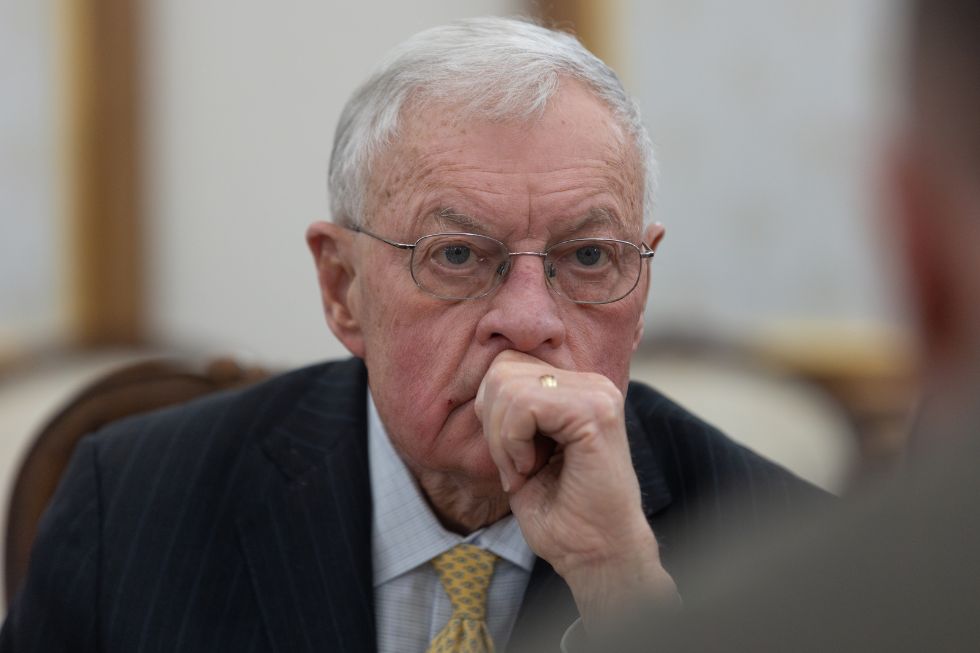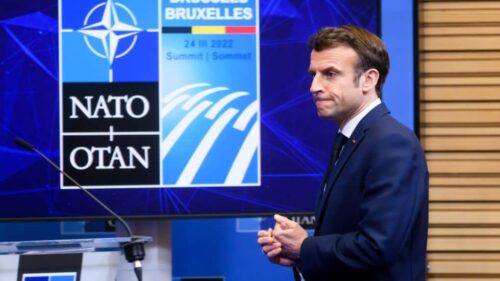Some of us old enough to remember the Cuban Missile Crisis of 1962 have maintained a sense of how fragile our enjoyment of the post World War II consumer society might be. In relation to the chaos alluded to in today’s news headlines, that dramatic Cold War episode had the singular advantage of clarity. We usually had a clear idea of how the governments involved defined their interests and how their leaders tended to reason.
That doesn’t mean there was no ambiguity, primarily caused by a diversity of interests and secondary personalities capable of influencing events. We now know about President John F. Kennedy’s struggle with the hyper-hawkish instincts of General Curtis LeMay, thirsting after the opportunity to nuke Fidel Castro’s regime, even at the risk of a global confrontation with the Soviet Union. The chairman of the Joint Chief of Staff, Maxwell Taylor, though less insistent, also favored aggressive action. LeMay became the inspiration for the character of Air Force Brigadier General Jack D. Ripper in Stanley Kubrick’s brilliant black comedy, Dr. Strangelove (1964) that was produced the following year. Spoiler alert: in the movie, Ripper succeeds in launching a nuclear war nobody wants.
In today’s world the Le Mays, Taylors and Turgidsons are now in leadership positions. Kennedy and Nikita Khruschev, thought, negotiated and worked to resolve a conflict whose contours — a standoff between two nuclear powers — nobody at the time was able to fully understand. As the John F. Kennedy Library and Museum’s archives reveal, the two leaders agreed to “dismantle the weapon sites in exchange for a pledge from the United States not to invade Cuba.” They agreed to leave the impression that Kennedy had demonstrated his strength by making no material concessions. But that was only to quiet the hawks. “In a separate deal, which remained secret for more than twenty-five years, the United States also agreed to remove its nuclear missiles from Turkey.”
What a contrast with today’s world! The current president of the US is a former real estate operator and TV reality show host known for his erratic behavior, superficially reasoned decision-making and undisciplined rhetoric. His allies in Europe no longer have the stature of a Charles De Gaulle, Willy Brandt, Harold Macmillan or Olaf Palme. French President Emmanuel Macron, German Chancellor Friedrich Merz, UK Prime Minister Keir Starmer — as well as the ineffable EU President Ursula von der Leyen — are nearly all largely unpopular even among their own electorates.
Most have been living in a state of utter confusion about their power, prestige and identity ever since George W. Bush’s eight years in the White House. That’s when they had the opportunity to discover the depth of their political irrelevance and its complement: their forced fealty to governments in Washington committed to the principle of spreading havoc globally as the means of asserting their hegemonic pretensions. Unlike De Gaulle in particular, they have entered a diabolical pact with the messianic prime minister of Israel (and documented war criminal), Benjamin “Bibi” Netanyahu. Bibi combines the warmongering instincts of Kubrick’s General Ripper with the cold-blooded calculation of Dr. Strangelove himself (a former Nazi “reformed” to become a US nuclear expert).
Today Trump, the peace president, has two wars to mismanage. Concerning Ukraine, the mercurial Trump appointed a certain Keith Kellogg to be his special envoy charged with ending the conflict. Kellogg was a military man who had risen to the rank of lieutenant general before retiring in 2003. During the September 11 attacks he worked at the Pentagon, with the title of Joint Staff’s J6 (Director of Command, Control, Communications, and Computers).
Still at work seeking a solution to the Ukraine quagmire, Kellogg was recently quoted by Ukrainian media outlet Ukrainska Pravda as he offered an imaginative explanation of the ceasefire the NATO partners have been hoping to impose in recent months. He began by helpfully explaining that the ceasefire concerned “the ground you are physically on, that is the ground that is yours now. You occupy that.”
Having established that simple truth, he set about imagining the ideal world Trump was bringing into being. At least in his imagination, a new world order, with new institutions, will emerge to replace the old one that everyone now agrees is rapidly fading. He begins by insisting on “a sustainable ceasefire long-term, sustainable not only for the Ukrainians but for Europe as well. And then try to get the Russians back into what I would call the League of Proper Nations. So everybody is kind of working together… Meaning you can all live with the results of this for the long term.”
Today’s Weekly Devil’s Dictionary definition:
Proper nation:
A country that earns its status simply by not being an “improper nation.”
Contextual note
Kellogg’s mental gymnastics and his taste for political fiction resemble an attempt to reconcile the most glaring contradiction in Trump’s stated approach to solving the Ukraine war. The man in the Oval Office is known for his “transactional bias.” He believes that all legal, moral and ethical questions can ultimately be solved by transforming them into profit-making business propositions. “Russia wants to do largescale TRADE with the United States when this catastrophic ‘bloodbath’ is over, and I agree,” AP reported on May 31.
Trump’s intuition wasn’t wrong. If the two sides were to sit down with a view to assessing who was to blame for the initial provocation, nothing could be accomplished. Trump prefers a world in which people stop bickering and get down to doing what’s expected of them:
- Extracting resources from resource-rich countries like Russia
- Mobilizing the financial wizards on Wall Street who can turn it all into global business
- Making it all work in the world’s varied consumer markets through the kinds of networks his centibillionaire friends Elon Musk, Jeff Bezos and Mark Zuckerberg have so brilliantly developed.
Whether it was Kellogg who invented the concept of a “League of Proper Nations” or whether it was something he heard in one of his conversations with his boss, it expresses the logic implicit in the new Utopia favored by Trump’s MAGA philosophy. But the question of how we should define a “proper nation” is likely to pose a few problems. The word “proper” has etymological roots that point in several directions. One is the idea of ownership. Another is neatness and cleanliness (“Keep thy garments proper and thy hands clean”). Yet another is “according to the rules.” What Kellogg seems to have in mind is the last one: nations that follow accepted rules of behavior or etiquette. It goes without saying that those rules will always be defined by and in the US, the “exceptional nation” (meaning exceptionally proper).
Historical note
The question of categorizing nations as either “proper” (worthy of being co-opted by the “league”) or improper happens to lie at the core of another conflict, one that has at least momentarily eclipsed Kellogg’s elusive Ukrainian ceasefire: the war between Israel and Iran. Our good friend, Edward Quince (a pseudonym) who has contributed regularly to our columns on the changing global monetary order, has shared with us some informal insight into the rationale Israel employed to launch its so-called pre-emptive war. Kellogg’s notion of a League of Proper Nations implies categorizing nations according to identifiable patterns of behavior. Here is how Quince frames the question concerning Israel’s apparent judgment that Iran cannot be considered a “proper nation:”
“Nobody is asking the key question: Is it even possible for one nation to coerce another nation to follow a certain course (in this case, abandoning nuclear armament ambitions) through long-range aerial attacks? There’s really only one example in history: the U.S./NATO coercion of Yugoslavia. But in that case, the bombardment was close-range, Yugoslavia was not Iran (in terms of size), and the U.S./NATO is not Israel (in terms of size and capability). However, the stated goals are one thing, and the real goals are another. It seems that the real goal is to get rid of the ayatollahs altogether, and their nuclear ambitions are just an excuse to attack them.”
Quince adds this comment: “It’s now clear that the ‘negotiations’ Trump started with the Iranians were nothing more than a textbook behavioral warfare tactic designed to trick the ayatollahs into not expecting an attack. Mr. Trump’s theatrical warnings to the Israelis against attacking Iran, Netanyahu theatrically rehearsing his son’s wedding (scheduled for June 16 ), the so-called ‘shuttle diplomacy’ in Oman — all of it was a smokescreen that lulled the Iranians into thinking they could ‘make a deal’ with the U.S.”
“Behavioral warfare” appears to sum up what the cleverest “proper nations” are expected to do. The problem is that such properly deceptive behavior sometimes produces disappointing results, as it has pretty consistently for the US in Vietnam, Afghanistan, Iraq, Libya, Syria… and the list goes on.
Edward Quince adds this final bit of reflection which Kellogg will undoubtedly find useful: “I am sure Mr. Putin’s team will no longer engage in any serious negotiations with Mr. Trump’s administration. It’s fair to expect cancellations of visits, meetings, envoys, and prisoner swaps for the time being. It’s unclear which way the war in Ukraine will go, but peace is less likely there today compared to two days ago.”
*[In the age of Oscar Wilde and Mark Twain, another American wit, the journalist Ambrose Bierce, produced a series of satirical definitions of commonly used terms, throwing light on their hidden meanings in real discourse. Bierce eventually collected and published them as a book, The Devil’s Dictionary, in 1911. We have shamelessly appropriated his title in the interest of continuing his wholesome pedagogical effort to enlighten generations of readers of the news. Read more of The Fair Observer Devil’s Dictionary.]
[Lee Thompson-Kolar edited this piece.]
The views expressed in this article are the author’s own and do not necessarily reflect Fair Observer’s editorial policy.
Support Fair Observer
We rely on your support for our independence, diversity and quality.
For more than 10 years, Fair Observer has been free, fair and independent. No billionaire owns us, no advertisers control us. We are a reader-supported nonprofit. Unlike many other publications, we keep our content free for readers regardless of where they live or whether they can afford to pay. We have no paywalls and no ads.
In the post-truth era of fake news, echo chambers and filter bubbles, we publish a plurality of perspectives from around the world. Anyone can publish with us, but everyone goes through a rigorous editorial process. So, you get fact-checked, well-reasoned content instead of noise.
We publish 3,000+ voices from 90+ countries. We also conduct education and training programs
on subjects ranging from digital media and journalism to writing and critical thinking. This
doesn’t come cheap. Servers, editors, trainers and web developers cost
money.
Please consider supporting us on a regular basis as a recurring donor or a
sustaining member.
Will you support FO’s journalism?
We rely on your support for our independence, diversity and quality.











Comment